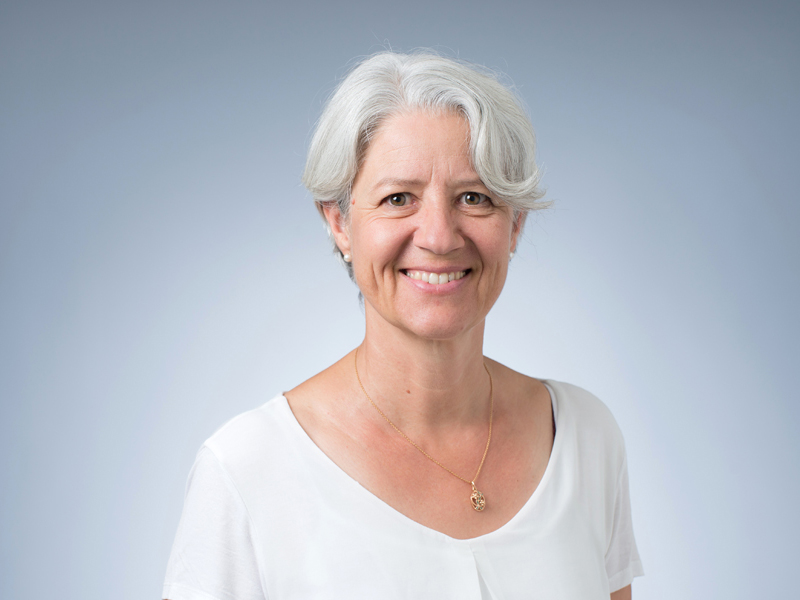Biography
Margot Thome-Miazza studied Biochemistry at the University of Tübingen and the University of Arizona, and carried out her PhD work in the laboratory of Oreste Acuto at the Pasteur Institute in Paris. As a postdoctoral fellow she worked with Jürg Tschopp at the University of Lausanne, where she studied apoptosis mechanisms and identified human and viral FLIP proteins as key apoptosis regulators. In 2004 she became Assistant Professor of the Swiss National Science Foundation at the Department of Immunobiology (formerly Biochemistry), at the University of Lausanne. She was appointed Associate Professor in 2009 and Full Professor in 2017. Since 2015 she is the Deputy Director of the Department. Her present research focuses on the molecular mechanisms of lymphocyte activation and lymphomagenesis.
Research Interests
Present work of the Thome laboratory focuses on the study of signaling pathways that control lymphocyte activation and survival and the development of lymphomas.
Lymphocytes play a crucial role in the defense against pathogens and tumor cells. One focus of our research is to understand the molecular mechanisms that control the activation of T-lymphocytes, initiated upon triggering of the T-cell antigen receptor by MHC-bound antigen. This leads to the initiation of multiple signaling pathways that regulate changes in cell shape and gene expression that are critical for efficient T-cell activation, proliferation and survival. Another focus of our research is to understand the molecular mechanisms underlying aberrant lymphocyte proliferation and survival that occurs in certain lymphoid tumors (lymphomas).
By uncovering new molecular players and enzymatic activities relevant to these pathways, we aim at identifying possible targets for therapeutic immuno-modulation or treatment of lymphomas.
Representative Publications
Pelzer, C., Cabalzar, K., Wolf, A., Gonzalez, M., Lenz, G. and Thome, M. Malt1 activity is controlled by monoubiquitination. Nature Immunol. 14, 337-347 (2013).
Jaworski, M., Marsland, B.J., Gehrig, J., Held, W., Favre, S., Luther, S.A., Perroud, M., Golshayan, D., Gaide, O. and Thome, M. Malt1 protease inactivation efficiently dampens immune responses but causes spontaneous autoimmunity. EMBO J. 33, 2765-2781 (2014).
Juilland, M., Gonzalez, M., Erdmann, T., Banz, Y., Jevnikar, Z., Hailfinger, S., Tzankov, A., Grau, M., Lenz, G., Novak, U. and Thome, M. CARMA1- and MyD88-dependent activation of Jun/ATF-type AP-1 complexes is a hallmark of ABC diffuse large B-cell lymphomas. Blood. 127, 1780-1789 (2016).
Bonsignore, L., Passelli, K., Pelzer, C., Perroud, M., Konrad, A., Thurau, M., Stürzl, M., Dai, L., Trillo-Trinoco, J., Del Valle, L., Qin, Z. and Thome, M. A role for MALT1 activity in Kaposi’s sarcoma-associated herpesvirus latency and growth of primary effusion lymphoma. Leukemia. 31, 614-624 (2017).
| Person | Position | Contact |
|---|---|---|
| Chantal Décaillet | Technician | Unisciences |
| Mélanie Favre (Juilland) | Research Associate | Unisciences |
| Laura Frizziero | Trainee | |
| Montserrat Gonzalez | Technician | Unisciences |
| Marcus Long | Postdoctoral Fellow | Unisciences |
| Manhui Luo | PhD Student | Unisciences |
| Katerina Pandeva | Technician | katerina.pandeva@unil.ch |
| Silvia Podavini | PhD Student | Unisciences |
| Harun-Or Rashid | Postdoctoral Fellow | Unisciences |

